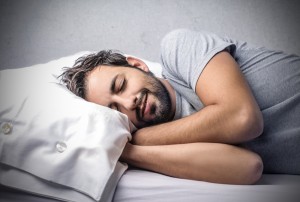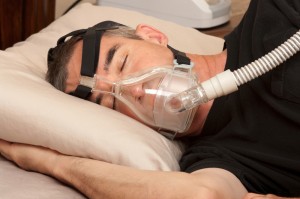With summer knocking on your door, everyone is getting ready to enjoy the summer sun as much as possible. Some may prepare for summer by buying the right food for the barbeque, other may be visiting the gym more often to get their bodies ready for the beach, but either way, summer is known for being a platform to creating lasting memories and endless amounts of fun. The most important thing in being able to enjoy your summer is making sure you have a restful night’s sleep. Many people suffer from sleep apnea without knowing it, and it is important to be able to recognize signs of the disorder in order to handle it correctly. Dr. Gary Radz wants his patients to be as informed as possible, being able to recognize the signs and symptoms that sleep apnea encompasses.
The most common form of sleep apnea is OSA, or obstructive sleep apnea. The word “apnea” literally means “without breath”, so when you sleep, your body’s breathing becomes interrupted for up to 10 seconds. Because this pause can happen several times in a single night, your body is left feeling more tired than it did when you went to bed. If you suffer from OSA, when you sleep, the soft palate in your mouth relaxes and collapses, causing your airway to become obstructed and narrower. This may cause you to snore excessively and loudly throughout the night, have short breaths, as well as other symptoms.
There are many side effects associated with sleep apnea, and none of them should be taken lightly. The effects include sudden death, increased nocturnal urination, diabetes, erectile dysfunction, and many, many more frightening health issues. If you feel as though you or your partner suffers from sleep apnea, make an appointment with Dr. Radz as soon as possible, and we can create a treatment plan just you.
Contact our office today to schedule your consultation with Dr. Radz and our experienced, compassionate team today. We look forward to showing you what a difference sleep apnea therapy can make in your daily life. Our conveniently located office proudly serves patients from throughout Denver, as well as the surrounding areas of Aurora, Englewood, Lakewood, Greenwood Village, Centennial, and more.
Sleep Well This Summer Tackling Your Sleep Apnea
June 18, 2014
Is Snoring Hurting Your Relationship?
May 15, 2014
 Loud snoring is a common issue that leads to problems between bed partners, often sending the hapless offender out of the room to spend the remainder of the night on the couch. Couples frequently argue over snoring and both parties typically get less restful sleep after all is said and done. Is snoring causing a rift between you and your partner? At the office of Dr. Gary M. Radz in Denver, CO, our team helps patients with excessive snoring find a sleep apnea treatment plan that fits their lifestyle.
Loud snoring is a common issue that leads to problems between bed partners, often sending the hapless offender out of the room to spend the remainder of the night on the couch. Couples frequently argue over snoring and both parties typically get less restful sleep after all is said and done. Is snoring causing a rift between you and your partner? At the office of Dr. Gary M. Radz in Denver, CO, our team helps patients with excessive snoring find a sleep apnea treatment plan that fits their lifestyle.
Snoring: More Than Just a Nuisance
While the sounds of snoring are certainly obtrusive, the underlying cause of this annoying noise may actually be of more concern than many people understand. The sound we associate with snoring is actually caused by the vibration of air through the passages formed by soft tissues in the nose, mouth, and throat. When these soft tissues obstruct proper airflow during sleep, the patient may experience a lapse in breathing. This is known as sleep apnea.
Not all people who snore suffer from sleep apnea, but because the disorder itself is considered potentially dangerous to health, disruptive snoring should be evaluated by a qualified professional. If sleep apnea is the reason for your snoring, sleep apnea therapy from Dr. Radz can help.
Schedule Your Appointment Today
If you or your partner frequently experiences loud, excessive snoring and it is creating problems in your relationship, you’re not alone. Fortunately, there are ways we can help. Contact our office today to schedule your consultation with Dr. Radz and our experienced, compassionate team today. We look forward to showing you what a difference sleep apnea therapy can make in your daily life. Our conveniently located office proudly serves patients from throughout Denver, as well as the surrounding areas of Aurora, Englewood, Lakewood, Greenwood Village, Centennial, and more.
How Much Sleep Do You Need Each Night?
April 22, 2014
 What does it take to be at your best during the day? It takes, among other things, a good night’s rest.
What does it take to be at your best during the day? It takes, among other things, a good night’s rest.
Many of us are not getting the rest we need, however. In our hectic world, long hours at work or family commitments can keep you awake for longer than you should be.
In today’s post, we want to give you some idea of how much sleep you need each night.
How much sleep you need depends a lot on your age. Not surprisingly, children need more sleep than adults. In general, most adults should sleep between seven to nine hours each night, at roughly the same time. Going to bed and waking up at different hours each day can make it difficult to sleep well at night. Aiming for a consistent schedule will help you get the rest you deserve.
For children, getting more sleep is important. Newborns should sleep anywhere from 12 to 18 hours a day. Babies three months old and older should get 14 to 15 hours. Even children who are between five and 12 should sleep at least 10 hours, if not more.
Of course, not everyone who feels sleepy during the day feels that way because he went to bed late. Some patients have trouble sleeping because of a condition like sleep apnea or snoring.
If you think you might struggle with one of these, call Dr. Radz’s Denver office for an appointment. We offer exceptional care for both to patients from Englewood, Aurora, Lakewood, Greenwood Village, Centennial, and beyond.
Tips for a Good Night’s Rest
March 26, 2014
 We spend a lot time on our blog talking about sleep apnea and snoring and how they’re treated. But not everyone who has trouble sleeping at night struggles with sleep apnea or snoring. Some patients could simply benefit from following a few of these tips for getting a better night’s rest.
We spend a lot time on our blog talking about sleep apnea and snoring and how they’re treated. But not everyone who has trouble sleeping at night struggles with sleep apnea or snoring. Some patients could simply benefit from following a few of these tips for getting a better night’s rest.
First, pay attention to the foods or drinks you’re consuming before bedtime. Eating too much or not enough can affect your quality of sleep, as can drinking caffeine or alcohol. Even just drinking too much water can stand in the way of truly restful sleep.
Having a pre-bedtime routine and going to bed at the same time every night can also help. Maybe you like to take a bad or shower before bed, or you enjoy a soothing cup of chamomile tea. Whatever it is, a routine will help your brain recognize that it’s time for bed. Meanwhile, your sleep schedule will help you get a consistent amount of sleep each night.
Just as important, make sure your room is dark enough to trigger the brain’s release of melatonin, the hormone that helps us sleep. And it will help to invest in pillows and a mattress that you’re truly comfortable on. A lumpy pillow or a mattress that’s not supportive enough will make it difficult to get comfortable and could lead to soreness in the morning.
Have you tried following these steps, but you still can’t seem to sleep well at night. Talk to Dr. Radz of Denver. During your appointment, he can ask you questions about your quality of sleep and whether you struggle with any sleep apnea symptoms. He can also schedule a sleep test for you that will help us determine if you need care for sleep apnea.
We’re happy to serve patients from Denver, Englewood, Aurora, Lakewood, Greenwood Village, Centennial, and nearby areas.
What Are the Health Risks Associated with Sleep Apnea?
February 17, 2014
It’s never a good idea to let a health problem go untreated. Not only will it make the specific problem itself worse, it can lead to new health issues or exacerbate pre-existing ones. That’s equally true of a condition like sleep apnea as it is of other kinds of problems. When this common but under-diagnosed condition isn’t addressed, the risk factors for other conditions may increase. In other cases, an existing condition may make sleep apnea worse.
Some of these health risks include:
- High blood pressure
- Heart disease
- Diabetes
- Acid reflux
- Weight gain
- Asthma
The connection between every one of these isn’t entirely clear, but there is a connection. For instance, patients who are overweight are more likely to experience sleep apnea, because of how extra weight can affect airways. As such, losing weight can help a patient treat sleep apnea and enjoy better rest at night. Similarly, the connection between sleep apnea and acid reflux isn’t clear, but treating reflux does seem to improve a patient’s sleep apnea symptoms.
Of course, there are simpler ways that sleep apnea can manifest in your life. Maybe you always feel sleepy at work, or you have trouble concentrating. A lack of sleep can also make it difficult to remember things, and you may find yourself having accidents at home, in the workplace, or behind the wheel.
Are you struggling with sleep apnea? Call Dr. Gary Radz’s Denver office today to find out how treatment is possible. We offer sleep apnea therapy to patients from Denver, Englewood, Aurora, Lakewood, Greenwood Village, Centennial, and beyond.
The Future of Sleep Apnea Therapy Could Be Very Different, But Until Then…
January 16, 2014
In our last post, we listed some of the common problems faced by patients who use continuous positive airway pressure (CPAP) to treat sleep apnea. Some of those reasons included dry mouth, congestion, and feelings of claustrophobia.
Because of these and other reasons, only 46-83% of patients using CPAP actually wear their mask, according to a recent New York Times article published this month. But in the future, maybe no one will have to wear a mask at all. The same article notes that a device called a neurostimulator may offer help by stimulating “a nerve in the jaw, helping to keep part of the upper airway open” in sleep apnea patients. The device is implanted in the chest and is compared by the writer to a pacemaker.
In the recently completed study on the device, 126 patients were given a neurostimulator, which they could active at night. The device works specifically by sending “regular electric impulses to a nerve inside the jaw,” which moves the tongue forward when the patient breathes in.
In the results, it was found that breathing cessation dropped dramatically while blood oxygen levels increased.
Neurostimulators haven’t yet been approved by the Food and Drug Administration, though. So until we know more about this very promising device, the best alternative to CPAP will be an oral appliance.
For years, Dr. Radz has been using oral appliance therapy to help patients from Denver and all surrounding areas sleep peacefully and stop snoring. This simple alternative uses a custom-made mouthpiece to adjust the position of the tongue and lower jaw, keeping airways open so breathing throughout the night is easy.
Is oral appliance therapy right for you? Call Dr. Radz’s Denver office today to schedule a consultation. We serve patients from Englewood, Aurora, Lakewood, Greenwood Village, Centennial, and other nearby communities.
10 Reasons to Consider Oral Appliance Therapy
December 17, 2013
 Oral appliance therapy is rapidly replacing CPAP as the primary way sleep apnea is treated. CPAP stands for continuous positive airway pressure and uses a machine to pump air to your lungs while you’re asleep. For many patients, treatment with CPAP has been effective, but that’s not the case for everyone who tries it.
Oral appliance therapy is rapidly replacing CPAP as the primary way sleep apnea is treated. CPAP stands for continuous positive airway pressure and uses a machine to pump air to your lungs while you’re asleep. For many patients, treatment with CPAP has been effective, but that’s not the case for everyone who tries it.
Below are 10 common problems that patients can have with CPAP—and alternatively, 10 reasons why you should learn everything you can about oral appliance therapy:
- Skin irritation around the CPAP mask
- Dry mouth
- Congestion, sneezing, or nosebleeds
- Bloating
- Difficulty wearing a mask while asleep
- Feelings of claustrophobia
- Problems sleeping due to noise
- Machine is keeping a partner awake
- Dry or sore eyes
- Mask leaks
Not every patient will struggle with these problems, but for those who do, an alternative is in order. At Dr. Radz’s Denver office, we’re happy to explain how oral appliance therapy works. If it looks like oral appliance therapy is the best solution for your particular needs, we can start collecting all the information we’ll need to have your customized mouthpiece fabricated.
Don’t let this common but under-diagnosed condition ruin your life. Call us today to schedule an appointment. Dr. Radz is happy to offer effective oral appliance therapy to patients from Denver, Englewood, Aurora, Lakewood, Greenwood Village, Centennial, and beyond.
What Causes Snoring?
November 13, 2013
One of the most common sleep problems that people can face is snoring. It’s not uncommon for family members to tease each other about another’s snoring, but sometimes it’s no laughing matter. Not only can relationships be strained by severe snoring, it can also be a sign of a larger problem—sleep apnea. Thankfully, the causes of snoring aren’t a mystery, and treatment is possible.
The Most Common Cause
In many cases, the cause of snoring can be tied to obstruction. In other words, the tongue, jaw, or the mouth’s soft tissues have relaxed to the point that the patient’s airways are blocked. The sound that you hear when someone snores is the sound of air noisily passing through the body to the lungs. That same obstruction is also what causes sleep apnea patients to stop breathing during sleep.
At Dr. Gary Radz’s office, we offer oral appliances to help patients treat both their snoring and their sleep apnea symptoms. An oral appliance is a custom-made device designed to fit over the patient’s upper and lower teeth, repositioning the jaw and tongue so that they don’t block the throat. For many patients, an oral appliance is the treatment of choice for both sleep problems and snoring.
Give Us a Call
Is snoring and sleep apnea getting in the way of your health or your relationships? Call Dr. Radz’s Denver office today for a consultation. During your visit Dr. Radz will help you understand your needs and find a treatment solution. We serve patients from Inglewood, Aurora, Lakewood, Greenwood Village, Centennial, and all surrounding areas.
The Effects of Sleep Apnea
October 22, 2013
In our previous post, we talked about what sleep apnea is and what often causes it. Today, we’d like to focus our attention on how untreated sleep apnea can affect your everyday life and your relationship with a partner. After all, sleep apnea isn’t just a slight inconvenience—it can have a serious impact on a patient’s health and quality of life.
But first, a reminder: sleep apnea is a condition in which a patient stops breathing for 10 or more seconds while asleep, causing the brain to wake the body up to breathe. Some patients aren’t even aware of waking up because they only move to a lighter stage of sleep. But whether you’re aware of it or not, a spotty night of sleep is still a spotty night of sleep.
Patients who struggle with sleep apnea may experience changes in mood, or they may find it difficult to stay awake at work or behind the wheel. This drowsiness can, in turn, put the patient at risk of having an accident. What’s more, with the stress and fatigue of interrupted sleep comes an inability to concentrate and even memory loss. More severe problems include high blood pressure and heart problems, or even premature death.
But these are just the symptoms that directly affect you. Because snoring is a common symptom of sleep apnea, your partner may not be getting a full night o rest either. Snoring can also put a great deal of strain on an otherwise healthy relationship.
Do any of these symptoms sound familiar? Thankfully, Dr. Gary Radz can provide relief with sleep apnea therapy. For a diagnosis or consultation, call our Denver dental office. We serve patients from Denver, Englewood, Aurora, Lakewood, Greenwood Village,Centennial, and beyond.
What Is Sleep Apnea?
September 19, 2013
Do you routinely feel tired during the day, even after going to bed early the night before? Have others noticed that you seem stressed or moody? All three of these are signs that you may be struggling with interrupted sleep as a result of sleep apnea.
Patients with this underdiagnosed condition stop breathing for 10 or more seconds during sleep. As a result, the brain sends out a signal waking them up to take a breath. Not every sleep apneapatient will wake up all the way, though; some only move to a lighter stage of sleep, which explains how a sleep apnea patient may be unaware of his or her problem.
In many cases, sleep apnea is caused by obstruction. This type is known specifically as obstructive sleep apnea syndrome, orOSAS. What causes the obstruction? The most common causes include the size of the patient’s airway passages, swelling, and the position of the tongue.
After the sleep apnea patient has returned to sleep, the cycle of sleeping and waking will continue throughout the night, leading to the drowsiness, stress, and moodiness we mentioned above. Sleep apnea can also make it difficult to concentrate and cause memory loss or accidents at home, work, or behind the wheel. If left untreated, it may also cause high blood pressure, heart problems, and premature death.
But thankfully, sleep apnea is treatable. As a locally and internationally recognized dentist, Dr. Gary M. Radz can provide effective relief at his Denver dental office. CPAP is a common and universally recognized treatment, but custom-made oral sleep appliances are quickly becoming the new standard for care.
Are you worried that you might be struggling with sleep apnea?Dr. Radz of Denver can help. Call us today for an appointment. We serve patients from Inglewood, Aurora, Lakewood,Greenwood Village, Centennial, and all surrounding areas.